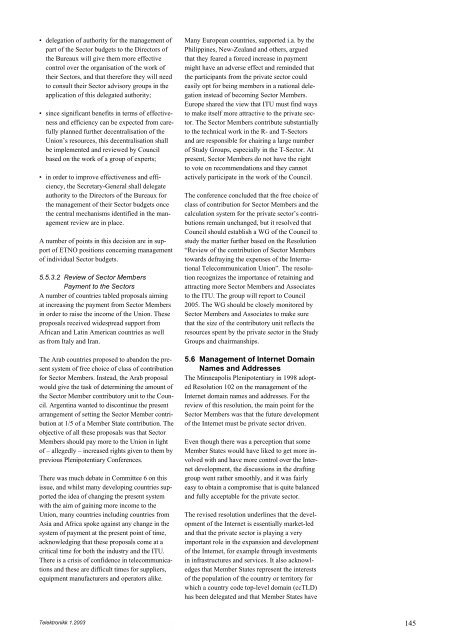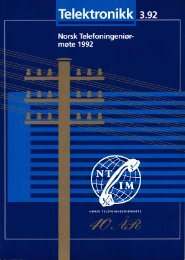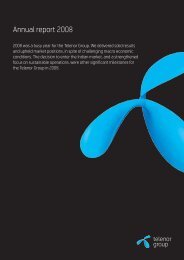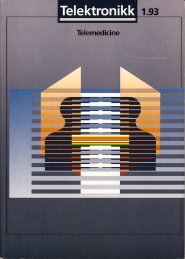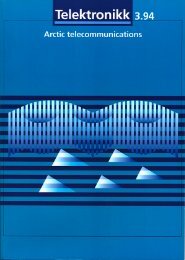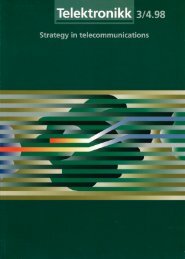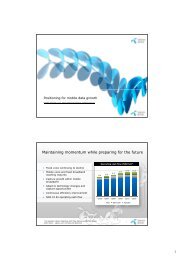Intelligent Transport Systems - Telenor
Intelligent Transport Systems - Telenor
Intelligent Transport Systems - Telenor
Create successful ePaper yourself
Turn your PDF publications into a flip-book with our unique Google optimized e-Paper software.
• delegation of authority for the management of<br />
part of the Sector budgets to the Directors of<br />
the Bureaux will give them more effective<br />
control over the organisation of the work of<br />
their Sectors, and that therefore they will need<br />
to consult their Sector advisory groups in the<br />
application of this delegated authority;<br />
• since significant benefits in terms of effectiveness<br />
and efficiency can be expected from carefully<br />
planned further decentralisation of the<br />
Union’s resources, this decentralisation shall<br />
be implemented and reviewed by Council<br />
based on the work of a group of experts;<br />
• in order to improve effectiveness and efficiency,<br />
the Secretary-General shall delegate<br />
authority to the Directors of the Bureaux for<br />
the management of their Sector budgets once<br />
the central mechanisms identified in the management<br />
review are in place.<br />
A number of points in this decision are in support<br />
of ETNO positions concerning management<br />
of individual Sector budgets.<br />
5.5.3.2 Review of Sector Members<br />
Payment to the Sectors<br />
A number of countries tabled proposals aiming<br />
at increasing the payment from Sector Members<br />
in order to raise the income of the Union. These<br />
proposals received widespread support from<br />
African and Latin American countries as well<br />
as from Italy and Iran.<br />
The Arab countries proposed to abandon the present<br />
system of free choice of class of contribution<br />
for Sector Members. Instead, the Arab proposal<br />
would give the task of determining the amount of<br />
the Sector Member contributory unit to the Council.<br />
Argentina wanted to discontinue the present<br />
arrangement of setting the Sector Member contribution<br />
at 1/5 of a Member State contribution. The<br />
objective of all these proposals was that Sector<br />
Members should pay more to the Union in light<br />
of – allegedly – increased rights given to them by<br />
previous Plenipotentiary Conferences.<br />
There was much debate in Committee 6 on this<br />
issue, and whilst many developing countries supported<br />
the idea of changing the present system<br />
with the aim of gaining more income to the<br />
Union, many countries including countries from<br />
Asia and Africa spoke against any change in the<br />
system of payment at the present point of time,<br />
acknowledging that these proposals come at a<br />
critical time for both the industry and the ITU.<br />
There is a crisis of confidence in telecommunications<br />
and these are difficult times for suppliers,<br />
equipment manufacturers and operators alike.<br />
Telektronikk 1.2003<br />
Many European countries, supported i.a. by the<br />
Philippines, New-Zealand and others, argued<br />
that they feared a forced increase in payment<br />
might have an adverse effect and reminded that<br />
the participants from the private sector could<br />
easily opt for being members in a national delegation<br />
instead of becoming Sector Members.<br />
Europe shared the view that ITU must find ways<br />
to make itself more attractive to the private sector.<br />
The Sector Members contribute substantially<br />
to the technical work in the R- and T-Sectors<br />
and are responsible for chairing a large number<br />
of Study Groups, especially in the T-Sector. At<br />
present, Sector Members do not have the right<br />
to vote on recommendations and they cannot<br />
actively participate in the work of the Council.<br />
The conference concluded that the free choice of<br />
class of contribution for Sector Members and the<br />
calculation system for the private sector’s contributions<br />
remain unchanged, but it resolved that<br />
Council should establish a WG of the Council to<br />
study the matter further based on the Resolution<br />
“Review of the contribution of Sector Members<br />
towards defraying the expenses of the International<br />
Telecommunication Union”. The resolution<br />
recognizes the importance of retaining and<br />
attracting more Sector Members and Associates<br />
to the ITU. The group will report to Council<br />
2005. The WG should be closely monitored by<br />
Sector Members and Associates to make sure<br />
that the size of the contributory unit reflects the<br />
resources spent by the private sector in the Study<br />
Groups and chairmanships.<br />
5.6 Management of Internet Domain<br />
Names and Addresses<br />
The Minneapolis Plenipotentiary in 1998 adopted<br />
Resolution 102 on the management of the<br />
Internet domain names and addresses. For the<br />
review of this resolution, the main point for the<br />
Sector Members was that the future development<br />
of the Internet must be private sector driven.<br />
Even though there was a perception that some<br />
Member States would have liked to get more involved<br />
with and have more control over the Internet<br />
development, the discussions in the drafting<br />
group went rather smoothly, and it was fairly<br />
easy to obtain a compromise that is quite balanced<br />
and fully acceptable for the private sector.<br />
The revised resolution underlines that the development<br />
of the Internet is essentially market-led<br />
and that the private sector is playing a very<br />
important role in the expansion and development<br />
of the Internet, for example through investments<br />
in infrastructures and services. It also acknowledges<br />
that Member States represent the interests<br />
of the population of the country or territory for<br />
which a country code top-level domain (ccTLD)<br />
has been delegated and that Member States have<br />
145


